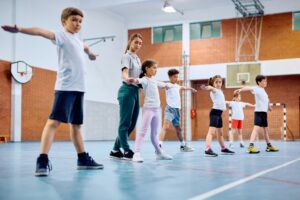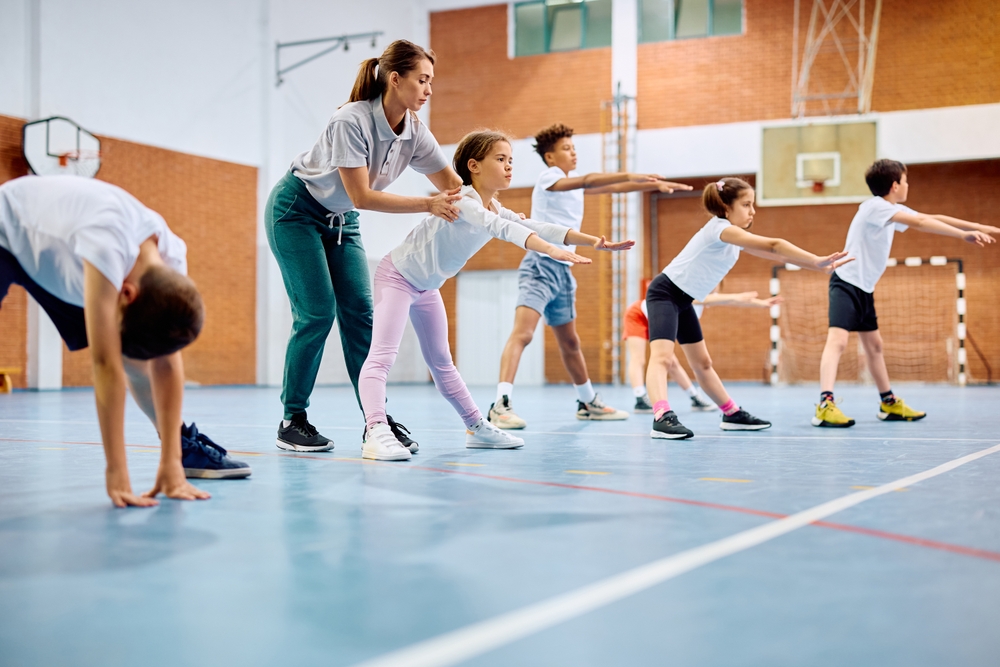What Are Physical Education Jobs?
The capability of human movement with respect to the integrity of the body should be taught by a PE person. PE professionals always get involved in sports and exercise training. Participating in sports and exercises includes playing team games-sports. PE depends on the professional who works whether in the school or camps, clubs. They teach their clients about Physical Education activities, sports, safety, and health protection practices. They instruct students on how to use their bodies properly. In other words, they nurture the health of students-from mind through body.
PE hours are mostly spent in a gymnasium or sometimes on the playground. The teacher walks the students through proper stretching, running, jumping, throwing, and so forth. They teach that playing fair and putting in effort is very important. PE teachers will also teach students how to correctly warm up and cool down from stretches to maintain body safety.

Some PE jobs include:
- PE teacher in schools.
- Fitness trainer in gyms.
- Coach in sports clubs.
- Adaptive PE teacher for students with special needs.
- Online PE coach who guides via video.
Each job asks for slightly different skills. A school teacher plans lessons according to the curriculum. A trainer works with adults or teens to reach fitness goals. A coach builds team skills and sports moves. An adaptive teacher alters games so that every student may be able to join. These jobs all share one aim and that is to help people move and feel better. They require energy, care, and clear talk. You guide people in safe ways. You cheer them on to do their best.
Why These Jobs Matter
Physical education jobs matter for groups and individuals. Active students pay better attention in class. They learn more easily. They feel more calm and happy. PE jobs give them a break from screens and books. You add joy, motion, and skill to their day.
You also teach teamwork. or ask students to pass, catch, run, or solve challenges. They learn to talk, share, and support. You build fair play. You teach effort and respect.
Main Roles & Responsibilities
You may take one of several roles in physical education. Each role asks you to do tasks that fit people you teach and places you work. Let’s break down key roles:
1. School PE Teacher
You plan daily lessons. can teach basic moves: running, jumping, throwing, teamwork and safety. and grade effort and skills. You chart progress. They keep equipment in order. You talk to parents or staff.
2. Fitness Trainer / Instructor
You meet clients one-on-one or in small groups. also design workouts. it show safe moves. or track progress. or motivate your clients. You adapt workouts as needs change. and help boost strength, stamina, or weight goals.
3. Sports Coach
You train sports skills and tactics. You host practices. and plan drills. it develop game plans. also push athletes to improve. keep monitor performance. or teach sportsmanship and effort under pressure.
4. Adapted PE Teacher
You work with students who need more support. or tailor exercises. use special tools. can match moves to ability. You build confidence and ability. it plan fun, safe, and inclusive lessons.
5. Online / Virtual PE Coach
You hold classes by video or share activity plans. and send demo clips. You give feedback. also ask for updates. or support clients who can’t come physically.
Who Can Be a PE Professional?
You can step into a PE job with the right traits and some training. Let’s see what works well:
- Strong communicator: You must explain moves clearly. You must hear needs and questions. You give feedback that builds trust.
- Energetic and enthusiastic: You lead by moving. Your energy fuels others. You keep lessons lively and fun.
- Patient and flexible: Not all people learn at the same pace. You adjust on the spot. You calm nerves and build courage.
- Caring and inclusive: You invite all students to join. You treat everyone with respect. You spot chances to offer extra help.
- Organized and safe: You plan lessons and manage tools. You watch for risks. You keep people injury-free.
In terms of background:
- Many school PE teachers have a bachelor’s degree in physical education, sports science, kinesiology, or education.
- Trainers usually have certifications such as those from ACE, NASM, or local equivalents, or they hold a diploma in sports.
- Coaches may have experience as a player, hold coaching certificates, or have training credentials.
- Adaptive PE teachers may hold additional training in special education or adaptive strategies.
- Online coaches need tech comfort and the ability to teach through screens.
Each route needs effort, but each leads to making a real difference. You can step forward with the right tools, training, and heart.
Education & Qualifications
A physical instructor’s job comes with certain qualifications. The requirements are dependent on the nature of a position and the region. But generally, they include gaining solid foundational knowledge.
A. School PE Teacher
- You’ll need this one for a bachelor’s degree in physical education, kinesiology, sports science, or another related field. Usually in addition to this, you’ll have to complete a teacher training program.
- Your country or state may require a teaching license or certification.
- You must pass exams or meet standards in teaching methods, health, and safety.
- It gain classroom experience through student-teaching placements.
- You may also do continuing education to stay current.
B. Fitness Trainer / Instructor
- The certification can range from a generic one up to the American Council on Exercise (ACE) or the National Academy of Sports Medicine (NASM). A similar certification may also be issued by a local authority.
- Some gyms or studios need a first aid and CPR certificate.
- You can start with a diploma in fitness, sports coaching, or exercise science.
- You may also build a portfolio of client results and sample workouts.
C. Sports Coach
- You may have playing experience in your sport.
- Perhaps you are awarded a coaching certificate by sports associations or boards.
- Most of the time, you gain your experience as an assistant coach.
- You might attend some coaching workshops and clinics.
- Typically, in the initial stages, you work with school teams or clubs and go higher up.
D. Adaptive PE Teacher
- You start with a degree in physical education or special education.
- You gain training in adaptive methods for diverse learners.
- They work closely with special educators and therapists.
- You build skills in modifying activities while keeping kids safe and engaged.
E. Online / Virtual PE Coach
- You need fitness or teaching credentials, depending on your target audience.
- You must know video tools, lesson planning, and remote feedback.
- Lessons may be taught by recording the same or by live classes or may even be drawn out as plans.
- You need a clear online presence and a way to track progress digitally.
No matter the path, you absorb skills and grow. You plan lessons. and lead moves. and inspire. You lift lives through motion.
Where to Find Physical Education Jobs
You can find physical education jobs in many places. The most common is a school setting. Public and private schools hire PE teachers for grades K-12. You can check your state or district job boards. Many schools post openings on education job websites.
PE staff also find jobs in colleges and universities. They may want instructors for general fitness class settings, a sports team, or research-related programs. They are often advertised on the job boards.
Sports laboratories and other community centers are the perfect workplaces for fitness trainers, coaches, and activity leaders. Local gyms are often in search of certified instructors. You can either apply directly or look in ads.
Government job portals may list PE openings for public programs. You might work in after-school activities, youth development, or sports outreach.
Private fitness companies also hire PE pros. They may need trainers for corporate wellness programs. You could run fitness workshops at offices.
Remote or hybrid PE coaching jobs are indeed advertised on online job platforms. This could be anything from teaching fitness classes on the video to creating workout plans or just giving feedback to the clients.
Networking is also key. Many jobs are filled through contacts in the field. Stay active in PE associations. Attend workshops and sports events. Join online groups where professionals share job tips.
Job Types in Physical Education
Physical education jobs vary widely. Each type has a unique focus and setting.
K-12 PE Teacher
These instructors take their youths all the way from kindergarten to high school. Movement skills, physical fitness activities, and team sports comprise the curriculum. Teacher and safety courses are given. The pupils are taught to collaborate with people and learn fair play.
College or University Instructor
You teach young adults. You might lead fitness labs, coach teams, or teach sports theory. College instructors may also do research or supervise interns.
Adaptive PE Specialist
You are with students who have physical, mental, or developmental challenges. or adapt activities to the abilities presented. You therefore desire that every student can participate safely and happily.
Sports Coach
You train athletes in one sport. You plan practices, teach strategies, and prepare for competition. Coaches work in schools, clubs, or professional leagues.
Recreational Program Leader
You run community fitness programs. This could be at a park, recreation center, or camp. You lead group games, exercise classes, and sports events.
Online PE Coach
You teach fitness remotely. You design exercise plans, share videos, and track progress. Clients may be children, adults, or special groups.
Corporate Wellness Trainer
You create health enhancement programs for office workers. The schedule may allow morning stretches, desk workout sessions, or some lunch-hour classes.
Each form of occupation comes with its merits. It’s a matter of skills, interests, and goals for your ideal career.
Salary and Benefits Overview (approx. 400–450 words)
Salaries in physical education jobs vary by role, location, and experience.
School PE Teachers
- General pay of Physical Education teachers at public schools in America: $45,000 a year to $65,000 a year.
- The pay may depend upon the kind of school district one’s working at, or years of experience.
- In general, teachers get health insurance, a retirement plan, and paid leave.
College or University Instructors
- Wages vary from $50,000 to $80,000 per year.
- There are many benefits provided to full-time positions: research opportunities, health benefits, and sabbaticals.
Fitness Trainers
- Trainers may earn $20–$40 per hour in gyms.
Private trainers can charge more, especially with a strong client base. - Many also earn bonuses for client growth.
Sports Coaches
- School coaches could be paid stipends between $2,000 to $6,000 for a season.
- Professional or elite coaches get a much bigger payday, sometimes cresting the six-figure mark.
Adaptive PE Specialists
- Salaries are similar to school PE teachers, often slightly higher for special certifications.
Online Coaches
- Income depends on clients and pricing. Some earn part-time income; others make a full-time living with subscriptions or programs.
In all roles, benefits may include:
- Timing flexibility
- With or without payment, gym memberships
- Career growth
- Traveling for competitions or events
Conclusion
Physical education jobs offer variety, purpose, and growth. They allow you to make a difference every day. Assist moving and acting in a better way while living healthier; also, acquire life skills.
The domain welcomes many roles. You may work in schools, colleges, gymnasiums, or online. You can coach sports, work in community programs, or oversee corporate wellness activities. Each way, in itself, is rewarding and challenging.
These jobs require energy, clear-cut communication, and concern for others. In return, they also give back through meaningful impact. You see the progress of your students and clients. Strength, confidence, teamwork are all things that develop inside your clients or students.




